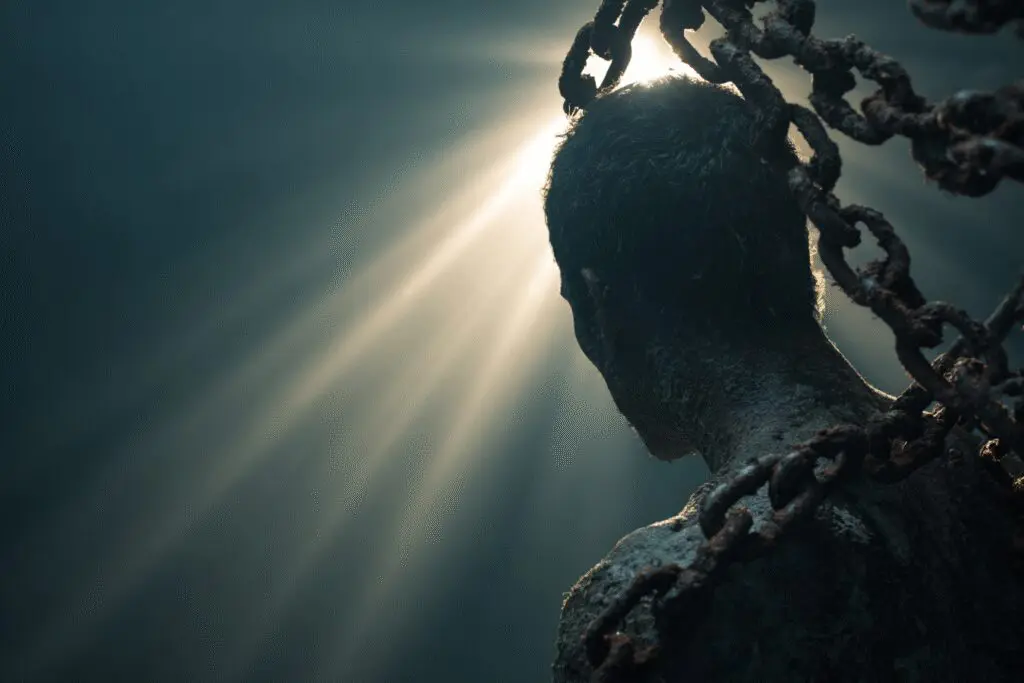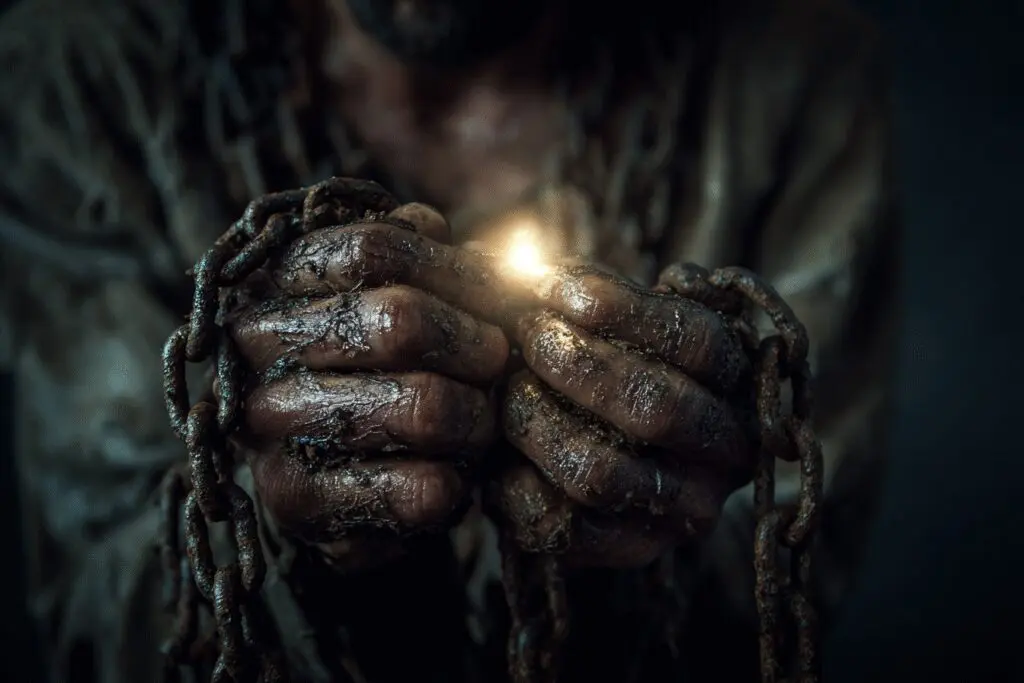Have you ever felt truly free, only to realize you were walking straight into a cage of your own making? I have. For years, I wrestled with this idea of freedom, especially as a Christian. The world tells you freedom is about doing whatever you want, whenever you want. And honestly, a part of us loves that idea. It sounds like the ultimate power. But through my own struggles and long nights spent staring at the ceiling, I’ve learned that true freedom looks radically different. The journey to understanding this began for me in a single, powerful verse that completely changed my perspective on what it means to be free. This brings us to the core of our discussion: What the Bible says about addiction, and how it’s all wrapped up in the profound truth of 1 Corinthians 6:12.
It’s a verse that can seem like a contradiction at first glance, but it holds the key to unlocking one of the most powerful and compassionate messages in all of Scripture about our struggles.
More in Ethics & Morality Category
Don’t Give Up Bible Scriptures
Key Takeaways
- Christian Freedom Isn’t a License: The phrase “All things are lawful for me” doesn’t mean we have permission to sin. Instead, it means that in Christ, we are no longer bound by the old law for our salvation.
- Helpfulness is the Standard: True freedom is measured by what is spiritually beneficial and constructive, not just by what is permissible. We should ask, “Does this build me and others up in faith?”
- Addiction is a Form of Slavery: The core of the verse, “I will not be dominated by anything,” directly addresses addiction. The Bible defines addiction as being mastered or enslaved by something other than God.
- The Body is a Temple: Our physical bodies are sacred and intended to be temples of the Holy Spirit. Addiction dishonors this temple.
- Hope is Found in Christ, Not Willpower: Overcoming addiction isn’t just about trying harder. It’s about surrendering our struggles to God and allowing His power to work through us, often within a community of fellow believers.
What Does “All Things Are Lawful” Really Mean in the Bible?
When the Apostle Paul wrote to the church in Corinth, he was speaking to a city that was, in many ways, like our modern world. It was a bustling port city full of different cultures, philosophies, and temptations. The new Christians there were wrestling with how to live out their newfound faith. Some of them took the idea of “freedom in Christ” and ran with it in the wrong direction, thinking it was a free pass to indulge in their old, destructive habits.
It’s in this context that Paul says, “All things are lawful for me.” He’s quoting a popular slogan that was likely being thrown around in the Corinthian church. He starts by agreeing with the premise, but only to completely reframe it.
Was Paul Giving Us a License to Do Anything?
Absolutely not. Think of it this way. When I first got my driver’s license at sixteen, I felt an incredible sense of freedom. Legally, I was permitted to drive my parents’ old sedan almost anywhere. I could go to the store, a friend’s house, or even drive a few states over if I wanted to. All of these things were “lawful” for me.
However, that license didn’t give me the right to be reckless. It was still unlawful, and just plain foolish, to drive 100 miles per hour through a school zone or to see if the car could handle a jump over a creek. My freedom to drive came with the responsibility to drive in a way that was safe, helpful, and wise.
Paul is making a similar point. In Christ, we are freed from the rigid ceremonial laws of the Old Testament that were once required to be right with God. Our salvation is secured by grace through faith, not by our works. But this incredible freedom isn’t meant to lead us back into bondage. It’s meant to lead us into a healthier, more glorious way of living.
How Can Something “Lawful” Not Be “Helpful”?
This is where Paul’s teaching gets incredibly practical for our lives today. He follows up his first statement with a crucial qualifier: “…but not all things are helpful.”
This shifts the question we should be asking ourselves. Instead of asking, “Is this technically a sin?” we should be asking, “Is this genuinely helpful for my relationship with God and my love for others?”
This was a game-changer for me. For a long time, I had a checklist mentality. I’d avoid the “big” sins, but I was filling my life with things that, while not explicitly forbidden, were slowly draining my spiritual life. They weren’t helpful. They were dead weight.
What is the Biblical Definition of “Helpful”?
In the original Greek, the word for “helpful” here is sympherō. It carries the idea of bringing things together for a common good. It means something that is advantageous, profitable, and contributes to a positive outcome.
So, when we evaluate our habits, choices, and the things we consume, we can use this as a filter:
- Does this bring me closer to God?
- Does this build up my brothers and sisters in Christ?
- Does this make me a better witness to the world?
- Does this contribute to my physical, mental, and spiritual well-being?
A few years ago, I realized the sheer amount of time I was spending on late-night TV and endless social media scrolling wasn’t sinful in itself. Nobody was getting hurt. But it was not helpful. It was stealing my energy for the next day, filling my head with anxiety, and robbing me of time I could have spent in prayer or with my family. It was lawful, but it was a spiritual dead end. Giving it up wasn’t about legalism; it was about choosing something better.
What is the Core of What the Bible Says About Addiction?
We now arrive at the final, most powerful part of the verse. Paul completes his thought by saying, “…I will not be dominated by anything.”
This is the Bible’s clearest statement on the nature of addiction. The Greek word here for “dominated” is exousiazó, which means to be brought under the power or authority of something. It means to be mastered, controlled, or enslaved.
This is precisely what addiction is. It’s a state where a substance, a habit, or a desire has become your master. It dictates your choices, consumes your thoughts, and demands your worship. Paul is saying that even if something is permissible and seems harmless, if it has the power to control you, it is a dangerous spiritual enemy. Freedom in Christ means that Jesus is our only master. We cannot serve two.
How Does Freedom in Christ Relate to Being Dominated?
True freedom isn’t the ability to do whatever you want. True freedom is the power to do what you should. It’s the ability to choose what is right, good, and helpful without being a slave to your impulses.
Addiction is the very opposite of this freedom. It whispers lies of pleasure and escape while wrapping chains around your soul. The Bible is clear that anything that takes the place of God as the central authority in your life is an idol. And addiction is a cruel master.
Here are just a few of the things that can dominate us, often starting as “lawful” habits:
- Substances like alcohol or drugs
- Gambling or financial recklessness
- Food and gluttony
- Pornography and lust
- The approval and opinions of other people
- Work and the pursuit of success
- Entertainment and digital media
- Bitterness and unforgiveness
The list could go on and on. The specific substance or behavior isn’t the root issue. The root issue is the slavery.
Does the Bible Talk About Addiction Anywhere Else?
While 1 Corinthians 6:12 provides the most direct definition, the entire Bible is a story about God liberating people from bondage. The themes of slavery to sin and freedom in God are everywhere.
What Does Proverbs Say About Self-Control?
The book of Proverbs is filled with wisdom about the importance of discipline and self-control. Proverbs 25:28 gives us a vivid picture of a life without it: “A man without self-control is like a city broken into and left without walls.”
Imagine an ancient city without walls. It would be completely vulnerable to attack from every direction. There would be no safety, no peace, no stability. This is what a life ruled by addiction is like. It’s a life of constant chaos and vulnerability because there are no defenses to protect the soul.
How Does Romans 7 Describe the Struggle with Sin?
If you’ve ever felt like you’re in a war with yourself, you’re not alone. The Apostle Paul was one of the greatest Christians who ever lived, and he was brutally honest about his own internal struggle. In Romans 7:15, he writes, “For I do not understand my own actions. For I do not do what I want, but I do the very thing I hate.”
Reading that for the first time was like a cool drink of water in a desert. It was a relief to know that this internal battle—the one where your spirit wants to do right, but your flesh screams for the thing that’s destroying you—is a recognized part of the human experience. The Bible doesn’t pretend we are perfect. It meets us in our messy, contradictory struggles and offers a way through.
Why is Our Body Called a Temple of the Holy Spirit?
It’s no coincidence that just a few verses after our main text, in 1 Corinthians 6:19-20, Paul gives us another profound truth. He asks, “Or do you not know that your body is a temple of the Holy Spirit within you, whom you have from God? You are not your own, for you were bought with a price. So glorify God in your body.”
This connects everything. Our bodies are not just disposable shells. If you are a believer in Christ, your body is a sacred space where the very Spirit of God dwells. Addiction, therefore, is not just a “bad habit”; it’s a desecration of a holy place. It’s inviting an enemy to set up a stronghold in God’s temple. But this verse is also filled with hope. You were “bought with a price.” The sacrifice of Jesus was powerful enough to purchase you, body and soul, out of the slave market of sin.
How Can I Find Freedom from Addiction Through Faith?
Understanding the biblical view of addiction is the first step. But how do we actually walk in that freedom? The Bible doesn’t just give us a diagnosis; it provides the cure. And it’s not found in simple self-help formulas or the power of positive thinking.
Is Prayer Really Enough to Overcome Addiction?
Prayer is absolutely essential, but it must be the right kind of prayer. It’s not about begging God to magically remove your desires while you continue to walk toward temptation. It’s a prayer of surrender. It’s saying, “God, I cannot do this. I am powerless. I give this battle to you. Show me the way out you have promised.”
It’s a moment-by-moment dependence, a constant conversation. It’s confessing when you fail, thanking Him when you stand firm, and asking for His strength for the next five minutes. It’s admitting your powerlessness and leaning completely on His power.
Why is Christian Community So Important for Recovery?
Addiction thrives in isolation. It feeds on secrets, shame, and the lie that you are the only one who struggles this way. God designed us to live in community for this very reason. Galatians 6:2 tells us to, “Bear one another’s burdens, and so fulfill the law of Christ.”
There is immense power in speaking your struggle out loud to a trusted Christian friend, a pastor, or a support group. When you bring your secret into the light, it begins to lose its power over you. Finding believers who will pray for you, hold you accountable, and remind you of God’s truth when you’re tempted to believe the lies is not a sign of weakness; it’s a sign of wisdom. You were never meant to fight this war alone. For anyone seeking to understand more about faith-based recovery, many Christian universities like Baylor University offer resources and insights that can be incredibly helpful.
What is the Real Hope the Bible Offers for Addiction?
The Bible’s message about addiction isn’t one of condemnation, but of profound, unwavering hope. It acknowledges the deep and painful reality of our struggles. It validates the feeling of being trapped and at war with ourselves.
But it does not leave us there.
The hope of the Bible is not that we will become strong enough to defeat our addictions on our own. The hope is that we have a Savior who has already defeated the power of sin and death. The freedom offered in Christ isn’t just a legal status; it’s a living power that works in us to change us from the inside out.
The journey out of the slavery of addiction is rarely a straight line. It involves repentance, surrender, community, and a daily choice to believe that God’s grace is bigger than our weakness. It’s a choice to believe that the one who bought you at a price will not abandon you. He is for you, He is with you, and He is the one who makes all things new. True freedom is found not in serving our desires, but in serving the one true Master who loves us completely.
Frequently Asked Questions – What the Bible Says About Addiction

What practical steps does the Bible recommend for overcoming addiction?
The Bible encourages believers to renew their minds by studying God’s Word, to run from temptation by avoiding situations that lead to sin, and to seek prayer and fellowship with other believers for support. These steps help in developing strength and resilience to pursue freedom in Christ.
What hope does the Bible offer to those struggling with addiction?
The Bible offers hope through the Gospel message of freedom in Christ. Jesus came to break the yoke of slavery caused by addiction and sin, providing a way for individuals to be truly free and start a new life filled with God’s grace and power.
Is addiction described in the Bible as a sin or a sickness?
The Bible indicates that addiction begins with sinful choices—choosing to find comfort outside of God. Over time, these repeated choices can create a strong bondage that may feel like a sickness. However, Jesus offers healing and the power to break free from this bondage.
Can Christians struggle with addiction, and what does the Bible teach about this?
Yes, Christians can struggle with addiction because we live in a fallen world with ongoing battles against sinful nature. The Bible acknowledges this struggle and encourages believers to walk by the Spirit, relying on God’s strength to resist the desires of the flesh.
What does the Bible say about addiction and how it relates to worship?
The Bible suggests that addiction is a form of worshiping a false god, which is anything we prioritize over God or look to for comfort instead of Him. When anything controls us, it becomes a false god, leading us away from true freedom and into slavery to our desires.




